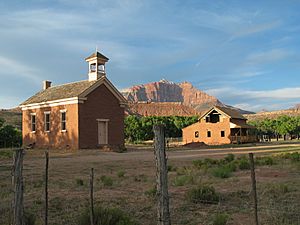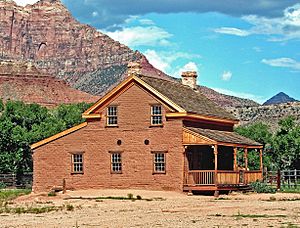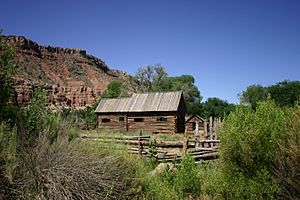Grafton, Utah facts for kids
Quick facts for kids
Grafton
|
|
|---|---|

The schoolhouse at Grafton. Built in 1886, it was also used as a church and public meeting place.
|
|
| Country | United States |
| State | Utah |
| County | Washington |
| Established | 1859 |
| Abandoned | 1921 |
| Named for | Grafton, Massachusetts |
| Elevation | 3,665 ft (1,117 m) |
| GNIS feature ID | 1437570 |

Grafton is a ghost town, a place where people used to live but now it's empty. It's located just south of Zion National Park in Washington County, Utah, United States. Many people say it's the most photographed ghost town in the West! It has even been used in movies like In Old Arizona (from 1929) and the famous Butch Cassidy and the Sundance Kid. The closest town where people still live is Rockville, which now includes the old Grafton area.
Contents
The History of Grafton
| Historical population | |||
|---|---|---|---|
| Census | Pop. | %± | |
| 1870 | 38 | — | |
| 1880 | 71 | 86.8% | |
| 1890 | 104 | 46.5% | |
| 1900 | 98 | −5.8% | |
| 1910 | 106 | 8.2% | |
| 1920 | 46 | −56.6% | |
| 1930 | 23 | −50.0% | |
Starting a New Town
The first people settled here in December 1859. They were part of a plan by Brigham Young to grow cotton in southern Utah. A group from Virgin started a new town called Wheeler.
But Wheeler didn't last long. A huge flood from the Virgin River almost destroyed it on January 8, 1862. This flood was part of the Great Flood of 1862, which lasted for weeks. The people rebuilt their town about a mile upriver. They named it New Grafton, after a town in Grafton, Massachusetts.
Early Growth and Challenges
The town grew quickly in its first few years. By 1864, there were about 28 families living there. Each family farmed about one acre (0.4 hectare) of land. The community also dug irrigation canals to bring water to their crops. They planted orchards, and some of these trees still stand today.
Grafton was briefly the main town, or county seat, for Kane County. This was from January 1866 to January 12, 1867. Later, in 1882, county borders changed. Grafton then became part of Washington County.
Struggles and Leaving Grafton
Flooding was a big problem for Grafton. Another challenge for farming was the large amount of silt in the Virgin River. Silt is like fine mud. Residents had to clean out their clogged irrigation ditches almost every week. This was much more often than in other towns.
Grafton was also quite far from other towns. It was the only community in the area on the south side of the river. In 1866, people became very worried about attacks from Native Americans. This was during the Black Hawk War. Because of this fear, everyone in Grafton moved to Rockville for safety.
Severe flooding continued to make it hard to live in Grafton. Most people decided to move permanently to easier-to-reach places across the river. By 1890, only four families were left. The town is usually considered abandoned in 1921. That's when the local church group, a branch of the Church of Jesus Christ of Latter-day Saints, closed down. The very last residents left Grafton in 1944.
In 1946, a news report said that movie producer Harry Sherman bought the town. He wanted to use it as a place to film movies. He bought it from William Russell, who was 80 years old. Russell was a descendant of one of the town's founders and one of only three people still living there.
Protecting Grafton's Past
Restoring the Townsite
In June 1997, a group called the Grafton Heritage Partnership was formed. Their goal is to protect, preserve, and restore the old Grafton townsite. They work with people who used to live in Grafton, the Utah State Historical Society, and other groups.
They have restored several old buildings. These include the old church, the Russell Home, and the Louisa Foster Home. They also fixed the Berry fence in the cemetery and the John Wood home. These buildings now have new windows, doors, and roofs. They look like they did when they were first built.
Farming and Future Plans
The partnership also bought about 150 acres (61 ha) of farmland. They now farm this land to make the town look like it did when people lived there. The site is watched 24 hours a day to keep it safe. The partnership is currently looking for someone to live there and help take care of the townsite.
 | William M. Jackson |
 | Juan E. Gilbert |
 | Neil deGrasse Tyson |




